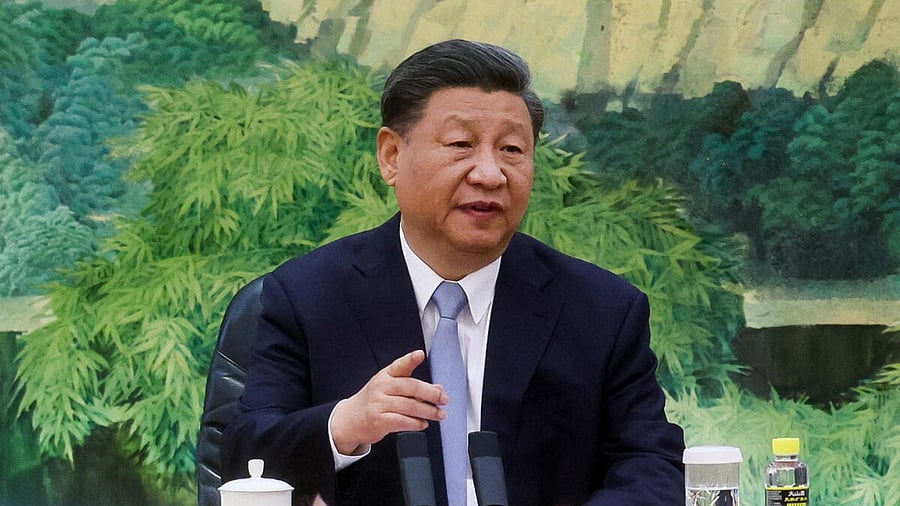
Xi Jinping
Credit: Reuters Photo
On February 17, in a closed-door event, Chinese President Xi Jinping attended and spoke to a meeting organised for the prominent private sector pioneers. It is reported that the meeting was attended by Alibaba’s Jack Ma, Huawei’s Ren Zhengfie, BYD’s Wang Chuanfu, Xiaomi’s Lei Jun, and DeepSeek’s Liang Wenfeng. However, executives of Baidu and ByteDance were not present.
Xi’s speech followed the statements made by the representatives of the private sector. This is not the first time that Xi has called on the private sector, as he had presided over a similar meeting in 2018, which had indicated that the government will adopt policies to boost the private sector. However, very soon it became obvious that things did not work out the way the world predicted.
During this meeting, Xi urged the private sector to “show their talents” and “the new era and new journey have broad prospects for the development of the private economy and great potential”. He further added that we need to “unify our thinking, strengthen our confidence and promote the healthy and high-quality development of the private economy”.
The meeting underscores the centrality of private sector to Chinese economic development and stability. As per the CGTN, “The private sector in China contributes 48.6 percent of foreign trade, 56.5 percent of fixed-asset investment, 59.6 percent of tax revenue, 60 percent of the GDP and 70 percent of technological innovation, while providing 80 percent of urban employment”. This clearly indicates that China’s private sector, despite restrictions, has managed to contribute positively to its economy. The recent success of DeepSeek, which has put the debate of Chinese-developed AI at the global forefront, has also renewed focus on its private sector.
The meeting also comes close to the National People’s Congress (NPC) deliberating on the first basic law which is focussed on the private sector. As per Global Times quoting Xinhua, “the draft law …. is written into law that promoting the sustained, healthy and high-quality development of the private economy is an important policy that the country will adhere to in the long run”.
Under Xi, the private sector has suffered given his bias towards the State-owned enterprises (SOEs). The epitome was the marginalisation of Jack Ma. This happened after he spoke at 2020 Bund Summit in Shanghai addressing regulations which would ‘stifle innovation’. He was quickly summoned to China Securities Regulatory Commission and his IPO was called off. This crackdown underscored what the future of China’s private sector would be under Xi.
In 2023, Ryan Hass, director of the China Center at Brookings, observed, “that the ideological rigidity of Xi and his lust for control is at odds with the pragmatism that defined China’s period of reform and opening and it is the private sector, previous which the engine of growth is paying the consequences”. An analysis by Kevin Rudd asserts that Xi views the world through the ‘Marxism-Leninism’ lens. The profit-driven and capitalist leaning private sector did not fit in Xi’s idea of economic rejuvenation or a Marxist economic growth.
It seems that given the continuous economic slowdown, the sluggish nature of the SOEs, and DeepSeek’s recent success has pushed Xi to look at the private sector in a more positive light. The rise of private sector was also unacceptable to Xi as it created another power lobby which had the capacity to challenge his policies and restrictions imposed. Since taking office Xi has made it clear that he wants to make the SOEs the driving force of Chinese economic growth. However, since Covid-19 and even after repeated efforts, the SOEs have lagged, and the private sector has soared.
This coupled with the re-election of Donald Trump as United States President and the talk of tariffs may even have played a role. This will also intensify the ongoing sanctions which Beijing faces vis-à-vis advanced chips and technologies. In the words of Christopher Beddor, deputy China research director at Gavekal Dragonomics in Hong Kong, “It's a tacit acknowledgement that the Chinese government needs private-sector firms for its tech rivalry with the US” and “The government has no choice but to support them if it wants to compete with the US”.
Though the government seems to be keen to encourage the private sector, given the history of policies and backlash faced under Xi, it seems private sector in China will need more than just encouraging words. The way Xi has put the brakes on private sector, just a meeting may not be enough to mend fences. Since 2020, the private sector has realised that if it must survive under Xi it will have to engage in areas and processes which have been approved by the CPC. A free reign of innovation and free speech which may be perceived as direct challenge to Xi’s and the CPC’s authority may be suicidal. It must mould itself to survive. In the words of Anne Stevenson-Yang, founder of J Capital Research, “As the private economy and entrepreneurs become more powerful, the party will rein them in”.
One cannot shake the feeling that even during the third plenum the assertion was of control of the market. So, this turn hinting towards catering to the needs of private sector may be temporary and may last till the CPC needs it.
In Xi’s red China, there is no space for any other form of development or innovation except one which takes place under the banner of the CPC. In a globalised world, the private sector which has been allowed to exist under Xi on tight leash will be continuously used as a tool whenever the party needs it.
(Gunjan Singh is Associate Professor, OP Jindal Global University.)
Disclaimer: The views expressed above are the author's own. They do not necessarily reflect the views of DH.